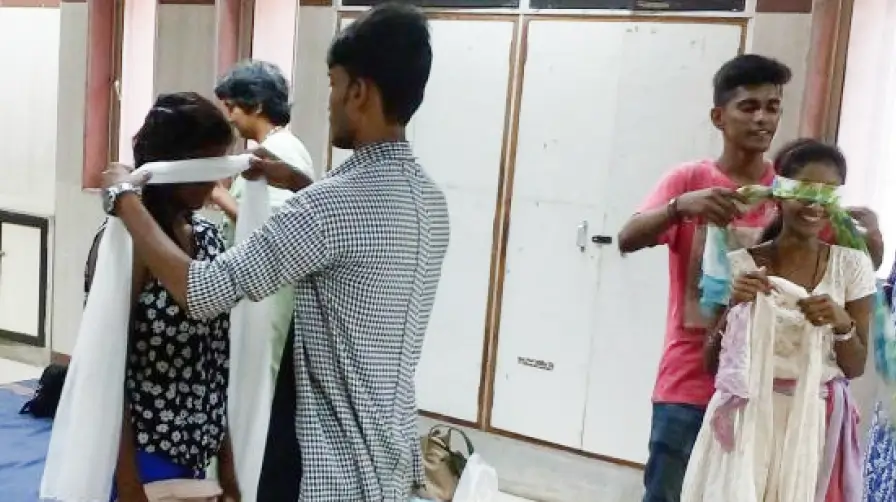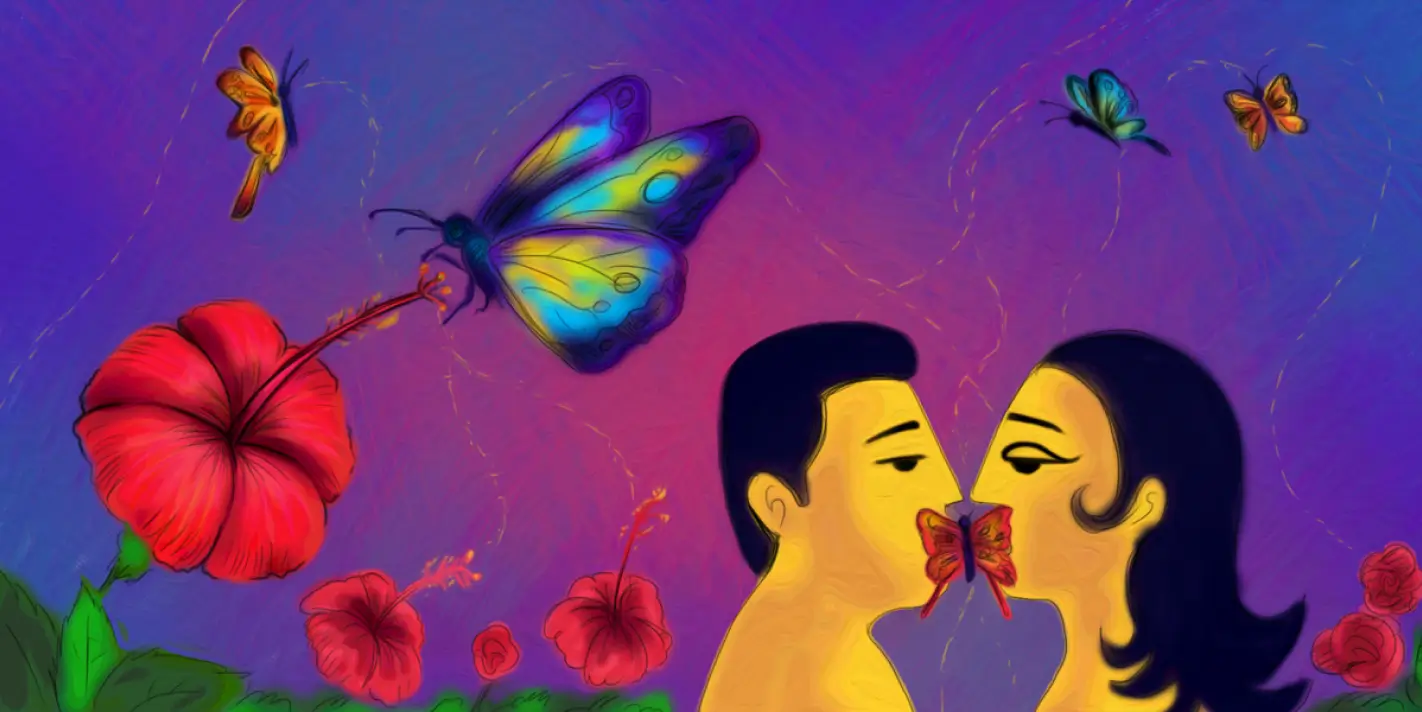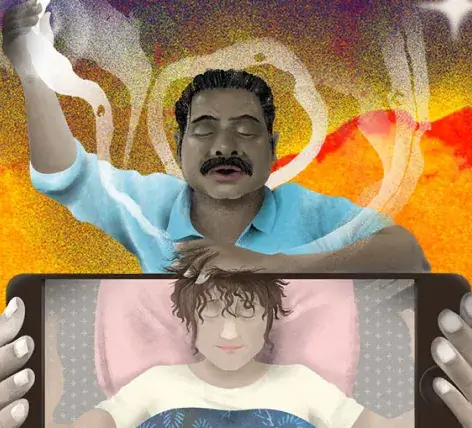Agents of ishq tell stories about love, sex, and desire in their own voices
The young man speaks with a slight lisp. His voice is gentle, dripping with laughter. “Mera naam AK hai, main ikkis saal ka hoon, aur yeh mere isi rainy season ki kahani hai… Chhoti si, happy kahani,” he says.
I am listening to AK’s podcast a few weeks after he recorded it, during the same rainy season, and as I listen to him talking about how he met a close friend one day, a male friend, who took him to a park nearby and told him he was in love with him, something in AK’s cheerful, happy, optimistic narration fills me with both joy and indignation. What kind of people can remain untouched by a voice like AK’s? Who are these people who would judge his love for his friend and find it “unnatural” and “dirty”? Do they not know people like AK, can’t they hear how normal, everyday and yet gloriously beautiful his story is?
And then it occurs to me that they don’t. They can’t. And this needs to change.
For any revolution to be successful, you need change agents. And for the sexual revolution in India to be understood, you need agents who can convey the message that sex, love and desire are not lewd, or a ‘Western influence’, or only about rebellion. You need more conversations about sex; not just normative, accepted-by-Indian-society and politically correct sex, but sex in all its weird, confusing, funny, crazy, sometimes icky glory. You need agents of ishq.
Digital is a language
Agents of Ishq is a multi-media project launched earlier this year by filmmaker, writer and columnist Paromita Vohra, who has been working in the gender and sexuality space in India since the early 2000s. While Vohra is perhaps better known as the writer of the award-winning film Khamosh Pani, her work in documenting love and sexuality in India have been enduringly influential. Among her documentaries is Unlimited Girls (2002), an exploration of feminism in India through narratives from different people who engage with feminism in different ways; or Morality TV Aur Loving Jehad (2007), which looks at the way the media feeds and inflates negative stories such as “love jehad”.
It was during the making of Unlimited Girls that Vohra first realised the “artistic possibilities of the digital space”, which allowed one to be both “political and personal” in one’s storytelling. “When we say ‘digital’ we often mean the technology. But digital is more than the technology. It is also a language. It allows you to develop new ways to tell stories and be creative,” says Vohra.
Love and art are open source software; they allow multiplicity and heterogeneity. I can take them and do what I want with them.
It was the desire to find a positive language to talk about sex and sexuality that led Vohra to create Agents of Ishq. There was also a realisation that in the aftermath of the Delhi rape case in 2012, sex and violence often got conflated. While the incident and the reactions it triggered changed a lot of things about Indian society and brought about a huge cultural shift, not least in the way feminism got into the mainstream discourse (to the extent that Chetan Bhagat has now attempted to write a ‘feminist novel’), it often led to anger and lashing out against patriarchy. Vohra clarifies that this is important and necessary — you do need to call out patriarchy and repression as often as possible — but at the same time, even as you denounce certain forms of sexual expression (Vohra uses the example of stalking, as represented in Hindi films and often replicated in real life), you are not providing the young and impressionable people of India with an alternate framework to talk about sex.
“There has to be a positive, happy way of talking about sex in our popular culture, because gritty hyper-realism is not enough. You often respond better to something a bit stylised and playful and ‘pop’,” Vohra tells me via a Skype call from her home in Mumbai. “Love and art are open source software; they allow multiplicity and heterogeneity. I can take them and do what I want with them.”
One of the ways to do this, Vohra and her team realised, is to let people talk about their experience of sex and sexuality in their own real, unfiltered voices. That’s where the Agents of Ishq podcasts come in. Even though many of them are anonymized, by the time you finish listening to each 12-15 minute podcast, you almost know these people.
When you hear someone talking, just listen to their voice as it changes and modulates with each memory and emotion, you really GET them
There is something liberating about listening to real people talking in their natural voices and in the language they are most comfortable in about some of the most unusual sexual experiences they have had. Also, these podcasts bring home what podcasts do — and do so well — without the mediation of writing or video. As a filmmaker, Vohra’s first instinct was “to put these people in front of a camera”, but then she realised they may be more candid and open if it was just voice, which has a certain undefinable tenderness and honesty.
Take a particular podcast recorded by a young woman who calls herself ‘Andrea’. In the podcast ‘The Reluctant Voyeur’, she talks about an incident that happened a few years ago, when she was spending the night at a friend’s house. Sometime during the course of the evening, the friend’s boyfriend came for a visit and also stayed over, and the three ended up sharing the same bed in the same room. Andrea, who was not sexually active at that time, found herself in an uncomfortable situation when she realised that the two people next to her were having sex, assuming (or perhaps not) that she was asleep. As she speaks about the incident and the way it affected her, you can almost feel her discomfort and embarrassment at being caught in this situation, as well as her struggle with accepting what was happening and not “being a prude”. Andrea also raises questions about consent — shouldn’t her friends have asked her if she wanted to be party to this? Wasn’t her privacy important?
Listen to Andrea talk about her experience here:
It’s been a few years since then, and the person who recorded the podcast, a young assistant director who lives and works in Mumbai, is more confident about her own sexuality and about the variety of sexual experiences and proclivities now. She had shared this story as part of a workshop that Agents of Ishq conducted at her college, Sophia College for Women, of which Vohra is also an alumnus, last year. Agents of Ishq was in the making at that time, and Vohra and her team were collecting stories that would form the backbone of the project when it went live. “The incident I talk about in the podcast happened two years ago. During the workshop, which was attended by around 10 of us from our department, we were asked to talk about our sexual experiences, especially unusual ones that had really affected us. This was the story that came to my mind,” Andrea tells me over the phone.
Talking about the incident with others at the workshop, she realised there was more to it than just her discomfort. It broadened her understanding of sex and sexual practices, and led to fewer negative feelings about the incident, which had unfortunately left a bad taste in her mouth and temporarily ruined her relationship with her friend. “I also understood that had I been sexually active myself at that time, I might have reacted to this in a different way,” she says.
While the podcasts sound spontaneous and natural, some work goes into getting the tone and the flow just right, says Andrea. “I wrote it down and sent it to them, and they helped me frame the narrative. It was a good idea to have it written instead of speaking extempore, as it clarified my thoughts and gave the story a certain order and structure,” the 23-year-old communications graduate says.
At the end of our conversation, she tells me I can use her real name, Ankita Sorot, in this story. “I am pretty ok with this now. It doesn’t make me feel awkward anymore,” she says.
Hamari kahaniyaan, aur Hindi mein baatcheet
So how do the agents of ishq go about collecting these stories, and recruiting more agents of ishq? It’s mainly done through workshops conducted by the group — spearheaded by one of its members, journalist and filmmaker Hansa Thapliyal — in educational institutions and social groups, as well as through collaborations with non-profit organisation that work with various gender-related communities. Among these organisations are the Mumbai-based SNEHA (Society for Nutrition, Education & Health Action), an NGO that has been working since the early 90s with people living in Mumbai slums; The YP Foundation, an organisation that works with young people and promotes, protects their human rights; and Khabar Lahariya, the local-language rural newspaper brought out by a team of intrepid first-time female journalists that we wrote about here.

“We gather podcasts in numerous ways. We do workshops with different groups, and some podcasts come from there. And we also seek out stories individually and sometimes people reach out to us with their stories. In all cases there is a process we carry out — different for different people — whereby we work with them on their podcasts,” explains Vohra.
While AOI is committed to having as many textures and diverse kinds of stories as possible, it is important for them to keep the online and offline interwoven. They are very proud of their online home on agentsofishq.com and their Facebook page, but they don’t want to exist exclusively in the online space, seeing the two spaces as extensions of each other.
The workshops have also extended their realisation that English-speaking youth in India have a global experience and language they can plug into, even as they navigate their sexual lives in an uniquely Indian way. They can often reach out to global pop-culture and its idioms when they want to express their feelings or talk about sexuality (think BuzzFeed). But, this is not true for a large majority of young people who don’t even have access to the right vocabulary to talk about sex and love in a positive way. In Hindi, for example, there isn’t a word for ‘queer’. However, this doesn’t mean they don’t have interesting stories to tell or the urge to tell them, and this is what Agents of Ishq discovered during its association with Khabar Lahariya, which has produced two podcasts so far — Chandni’s story and ‘Qayanat ka romancenama‘, a bittersweet lovestory exquisitely framed by the Main Hoon Na song Tumse milke dil ka hai jo haal kya kahein.
Here, listen to Chandni, a young married woman who works with Khabar Lahariya as a reporter, talk about how she fell in love with the driver of the vehicle that took them into the interiors of Bundelkhand:
The association with Khabar Lahariya began when the rural organisation wrote to AOI asking if they could use their podcasts on their site and also sought permission to carry some of its written pieces and infographics in translation. Then they asked if AOI could do one of its workshops with them, because they were inspired by the podcasts and wanted to start doing them.
Vohra and Thapliyal went to Chitrakoot, the rich-in-mythology district in Uttar Pradesh, to do the workshop. It was a “fabulous, enlivening experience”, says Vohra. “I think these are the amazing connections the feminist movement on the ground has always had… these connections across class and caste for women in an environment of exchange. And these days which you spend working together, then roaming about in the evening, eating chaat and doing things young girls do, they are lovely.”
While they ended up with six original podcasts, AOI is trying to raise some funds now, and if it is able to do that, it intends to do more with Khabar Lahariya and similar groups. “Maybe this time, also work with the women who were in the workshop and help them go out and do some podcasts, maybe edit them together, to build on what we did as a first round. Depends on what kind of money we can raise,” says Vohra. The project had received a grant earlier, which has just run out, and Vohra admits that without some sort of funding, it will be a challenge to run the project on her own steam.
She is a bohemian soul in the truest sense, much more unconventional and driven by an inner truth than a whole suburb of hipsters who claim to be
non-conformist
As for Chandni’s story, Vohra finds it unique in several ways — not least because of its ambiguity about sexual fidelity and marriage, which it does not directly address but gently keeps aside. “Chandni has been with Khabar Lahariya for many years and you can see that an engagement with the movement, with a different life, has made her very reflective and open-minded — not only sexually but about everything. She is a bohemian soul in the truest sense, much more unconventional and driven by an inner truth than a whole suburb of hipsters who claim to be non-conformist,” says Vohra. These are the stories from within India where you see that there are so many different lives and sexual realities in our culture, she believes.
When Chandni talked of her story she said a lovely thing: “At first when you do something different everyone recoils. But slowly, as you keep doing it, your belief influences them and they come round to it. That’s how you should live life
— on your terms, not others.”










